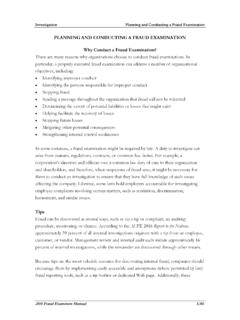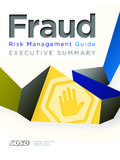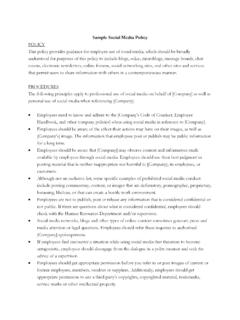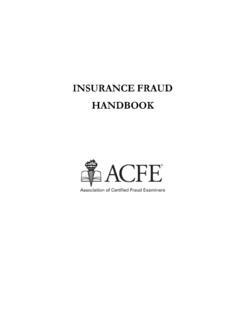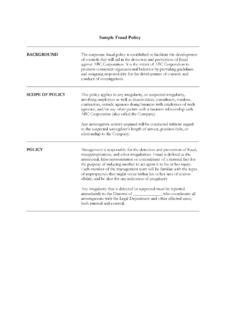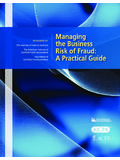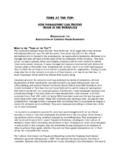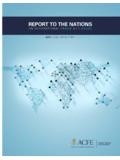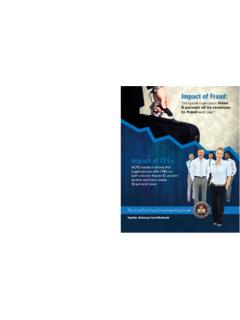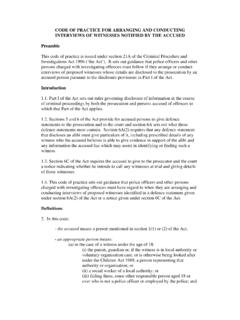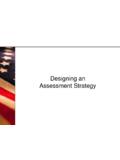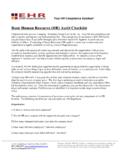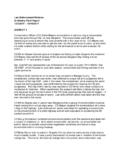Transcription of PLANNING AND CONDUCTING A FRAUD …
1 Investigation PLANNING and CONDUCTING a FRAUD examination PLANNING AND CONDUCTING A FRAUD examination . Why Conduct a FRAUD examination ? There are many reasons why organizations choose to conduct FRAUD examinations. In particular, a properly executed FRAUD examination can address a number of organizational objectives, including: Identifying improper conduct Identifying the persons responsible for improper conduct Stopping FRAUD Sending a message throughout the organization that FRAUD will not be tolerated Determining the extent of potential liabilities or losses that might exist Helping to facilitate the recovery of losses Stopping future losses Mitigating other potential consequences Strengthening internal control weaknesses In addition, in some instances, a FRAUD examination might be required by law.
2 A duty to investigate can arise from statutes, regulations, contracts, or common law duties. For example, a corporation's directors and officers owe a common law duty of care to their organization and shareholders, and therefore, when suspicions of FRAUD arise, it might be necessary for them to conduct an investigation to ensure that they have full knowledge of such issues affecting the company. Likewise, there are several laws that hold employers accountable for investigating employee complaints involving retaliation, discrimination, harassment, and other issues covered by the law. What FRAUD examination Entails The term FRAUD examination refers to a process of resolving allegations of FRAUD from inception to disposition, and it is the primary function of the anti- FRAUD professional.
3 The FRAUD examination process encompasses a variety of tasks that might include: Obtaining evidence Reporting Testifying Assisting in FRAUD detection and prevention 2014 FRAUD Examiners Manual PLANNING and CONDUCTING a FRAUD examination Investigation Obtaining Evidence The value of a FRAUD examination rests on the credibility of the evidence obtained. Evidence of FRAUD usually takes the form of documents or statements by witnesses; therefore, FRAUD examiners must know how to properly and legally obtain documentary evidence and witness statements. Reporting Once evidence has been obtained and analyzed, and findings have been drawn from it, the FRAUD examiner must report the results to the designated individuals ( , management, the board, or the audit committee).
4 A FRAUD examination report is a narration of the FRAUD examiner's specific activities, findings, and, if appropriate, recommendations. Such communications are necessary so that those responsible can determine the appropriate course of action. The results of an examination can be communicated in various ways. The appropriate report depends on the facts of each situation, but most reports are communicated orally or in writing. When communicating the results of a FRAUD examination , the FRAUD examiner is responsible for providing clear, accurate, and unbiased reports reflecting the FRAUD examination results. This need arises from the possibility that such results might end up being read or used by various groups of people, such as organization insiders, attorneys, defendants, plaintiffs, witnesses, juries, judges, the media, and so on.
5 Testifying to Findings Often, FRAUD examiners are called upon to provide testimony and report their findings at a deposition, trial, or other legal proceeding. When providing testimony, FRAUD examiners must be truthful. They should also communicate in a clear and succinct manner. Assisting in the Detection and Prevention of FRAUD FRAUD examiners are not responsible for the prevention of FRAUD ; such responsibilities belong to management or other appropriate authority. Nevertheless, FRAUD examiners are expected to actively pursue and recommend appropriate policies and procedures to prevent FRAUD . 2014 FRAUD Examiners Manual Investigation PLANNING and CONDUCTING a FRAUD examination Because of their education, experience, and training, Certified FRAUD Examiners are uniquely qualified to assist organizations in the prevention and detection of FRAUD .
6 FRAUD examination and Forensic Accounting Although FRAUD examination shares certain characteristics with forensic accounting, they are not the same discipline. Forensic accounting is the use of professional accounting skills in matters involving potential or actual civil or criminal litigation. The word forensic is defined by Black's Law Dictionary as used in or suitable to courts of law or public debate. Therefore, forensic accounting is actually litigation support involving accounting. Accordingly, most FRAUD examinations involve forensic accounting, but not all forensic accounting is FRAUD examination . For example, an individual hired to value the property in a minority shareholder derivative suit would engage in forensic accounting even if the engagement does not involve FRAUD .
7 While FRAUD examinations can be conducted by either accountants or nonaccountants, forensic accounting work can only be performed by accountants. In addition, while forensic accounting is litigation support work that involves accounting, FRAUD examinations only involve anti- FRAUD matters. Most FRAUD examinations will generally fall under the category of forensic accounting because the majority of FRAUD examinations, investigations, and reports regarding FRAUD are done with an eye toward litigation. This is because FRAUD examiners are taught to conduct FRAUD examinations with the assumption that they will end in litigation. Forensic accounting can include many professional services.
8 Typically, forensic accountants perform assignments involving: Computer forensics Electronic discovery Bankruptcies, insolvencies, and reorganizations Workplace FRAUD investigations Calculations of economic losses 2014 FRAUD Examiners Manual PLANNING and CONDUCTING a FRAUD examination Investigation Business valuations Professional negligence FRAUD examination Methodology FRAUD examination is a methodology of resolving signs or allegations of FRAUD from inception to disposition. The FRAUD examination methodology establishes a uniform, legal process for resolving signs or allegations of FRAUD on a timely basis. It provides that FRAUD examinations should move in a linear order, from the general to the specific, gradually focusing on the perpetrator through an analysis of evidence.
9 FRAUD examinations involve efforts to resolve allegations or signs of FRAUD when the full facts are unknown or unclear; therefore, FRAUD examinations seek to obtain facts and evidence to help establish what happened, identify the responsible party, and provide recommendations where applicable. When CONDUCTING a FRAUD examination to resolve signs or allegations of FRAUD , the FRAUD examiner should assume litigation will follow, act on predication, approach cases from two perspectives, move from the general to the specific, and use the FRAUD theory approach. Assume Litigation Will Follow Each FRAUD examination should begin with the proposition that the case will end in litigation.
10 Thus, when a FRAUD examiner begins a FRAUD examination , he must assume that the case will end in litigation, and this assumption must be maintained and considered throughout the entire examination . If the FRAUD examiner assumes that litigation will occur, he will conduct the examination in accordance with the proper rules of evidence and remain well within the legal guidelines established by the court systems. Act on Predication FRAUD examinations must adhere to the law; therefore, FRAUD examiners should not conduct or continue FRAUD examinations without proper predication. Predication is the totality of circumstances that would lead a reasonable, professionally trained, and prudent individual to believe that a FRAUD has occurred, is occurring, and/or will occur.
